 Petzlover
Petzlover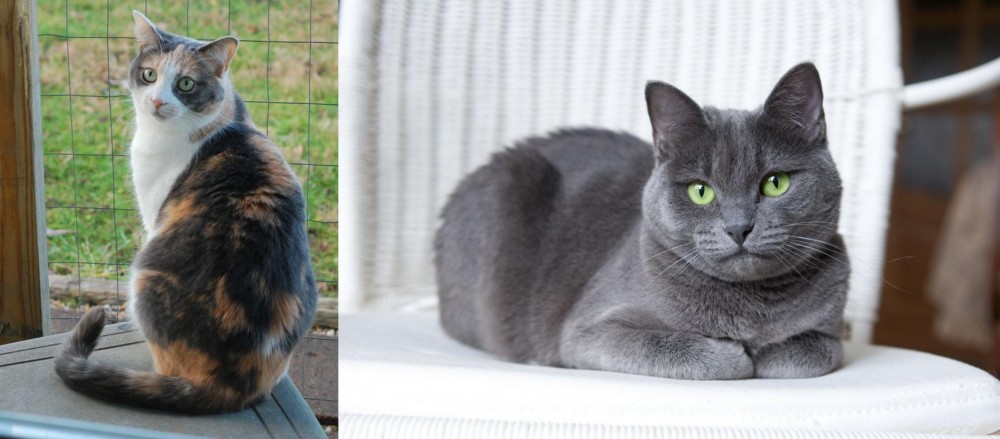 Dilute Calico is originated from Egypt but Russian Blue is originated from Russia. Both Dilute Calico and Russian Blue are of same weight. Both Dilute Calico and Russian Blue has same life span. Both Dilute Calico and Russian Blue has same litter size. Dilute Calico requires Moderate Maintenance. But Russian Blue requires Low Maintenance
Dilute Calico is originated from Egypt but Russian Blue is originated from Russia. Both Dilute Calico and Russian Blue are of same weight. Both Dilute Calico and Russian Blue has same life span. Both Dilute Calico and Russian Blue has same litter size. Dilute Calico requires Moderate Maintenance. But Russian Blue requires Low Maintenance
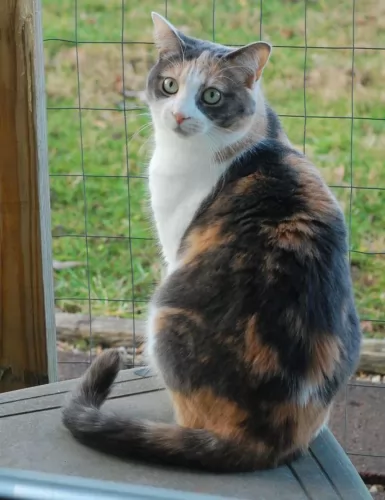 The Calico isn’t a breed of cat but is describing a color and pattern of the cat. Many breeds of cats can be calico, and ‘Dilute Calico’ simply means that the color of the cat is less intense.
The Calico isn’t a breed of cat but is describing a color and pattern of the cat. Many breeds of cats can be calico, and ‘Dilute Calico’ simply means that the color of the cat is less intense.
An example of this would be cream being the dilute shade of red, almost like strawberry blonde. People interested in the origins of the cat trace its history back to the trade routes in Northern Africa and Europe, and more specifically to the port cities along the Mediterranean Sea.
A Calico cat is described as having 3 colors - white, black, and red and Dilute Calico cats have ‘toned down’ shades of these 3 colors.
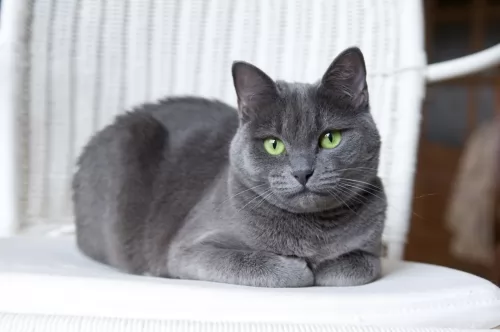 It is believed that this beautiful cat originates from Russia, and more specifically the Archangel Isles.
It is believed that this beautiful cat originates from Russia, and more specifically the Archangel Isles.
It is also thought that these cats descended from cats that were kept by the Russian Czars and that they arrived in England and Northern Europe during the 1860s. It appeared in cat shows and by 1912 it was given its own classification.
The cat was also introduced to the United States in the early 1900s and today it is a popular domesticated pet.
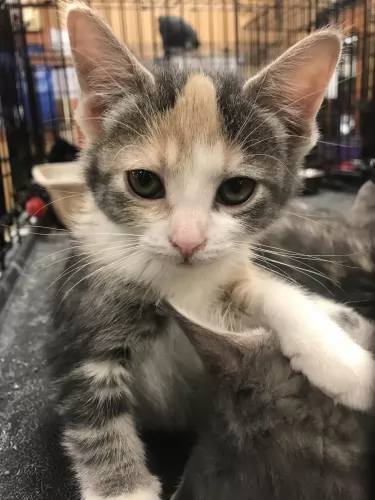 These are beautiful cats that can essentially have any size and shape and can weigh between 3 and 6kg. Their coat too can be in different colors and patterns and these don’t have any effect on the cat’s persoality.
These are beautiful cats that can essentially have any size and shape and can weigh between 3 and 6kg. Their coat too can be in different colors and patterns and these don’t have any effect on the cat’s persoality.
Your Dilute Calico can have a short- or long-haired coat. Also, because the dilute calico coloring isn’t linked to any particular cat breed, these cats can be any size or shape really.
They are also nearly always female. Remember that while genes do have an effect on how your Dilute Calico looks and behaves, socialization plays a big part, and where possible, to get your cat from a reputable breeder.
Because calico cats are a coat-color and not a breed, you can find long hair dilute calico cats. The personality of the Dilute Calico is described as colorful as well as they’re fun-loving, independent, spunky cats that are sweet and loving too.
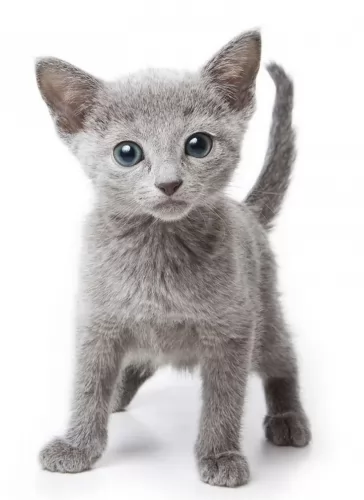 The medium-sized Russian blue cat is slender, strong, and muscular with long legs. He can weigh between 3 and 6kg.
The medium-sized Russian blue cat is slender, strong, and muscular with long legs. He can weigh between 3 and 6kg.
He has a beautiful blue, soft double coat that is short and thick. The coat is an even color with silver tips. What is an attractive feature of this cat too is that his double coat doesn’t shed much. The cat has a triangular-shaped head with yellow to green eyes.
The Russian Blue is such an amicable, sweet-tempered cat that likes nothing more than to be in the company of his human owners, He is calm and independent. They do well living with their human families but they do tend to form a deep bond with that one special person.
He will even follow his owner everywhere and is a loving, loyal companion. The Russian Blue is a social cat but also enjoys some quiet time out just to chill. He also isn’t too fond of visitors and may run away and hide if the occasion becomes too large and noisy.
This is a cat that will miss you when you’re at work all day but he is able to quietly wait for your arrival back home. Then he will appreciate some playtime.
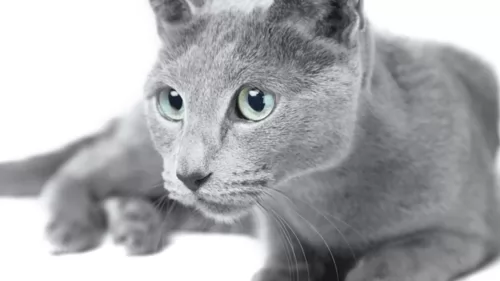 Your Russian Blue is such an intelligent cat and for this reason, when you bring one into your home, you’ll need to provide him with lots of stimulating toys and fun play times.
Your Russian Blue is such an intelligent cat and for this reason, when you bring one into your home, you’ll need to provide him with lots of stimulating toys and fun play times.
This is also a low maintenance cat and a brush once a week will be all that is required.
These are cats that love their mealtimes and you’ll want to work out a special eating program to ensure he gets all the nutrition he needs without over-eating.
Respond with lots of love and attention to your vocal Russian Blue, and you’ll soon see what a precious jewel this cat is as a companion and friend.
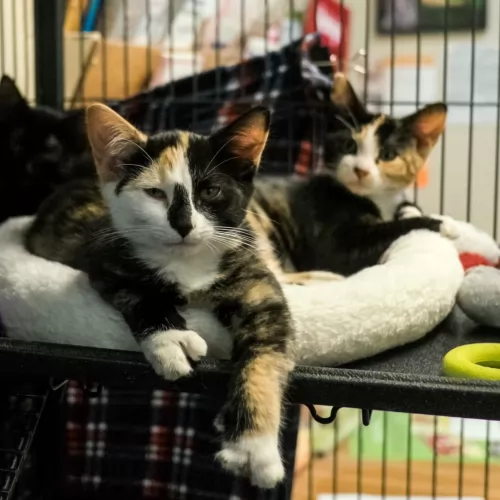 As already mentioned, the Dilute Calico isn't a specific breed but rather a color. The calico can be any breed. The average lifespan of any cat is 12-16 years. The males are far rarer than the females and they live shorter lives.
As already mentioned, the Dilute Calico isn't a specific breed but rather a color. The calico can be any breed. The average lifespan of any cat is 12-16 years. The males are far rarer than the females and they live shorter lives.
Cancer is a terrible disease in cats and dogs and it is where cells grow uncontrollably, spreading to all areas of the body. For any sign of illness in your Dilute Calico, get him to the vet.
Make sure your cat is vaccinated against the deadly cat diseases there are such as Feline Immunodeficiency Virus (FIV).
Both males and females can develop lower urinary inflammation, which is also called Feline Lower Urinary Tract Disease (FLUTD). You’ll notice your pet straining to urinate. It’s time to get your pets to the vet with this terrible illness.
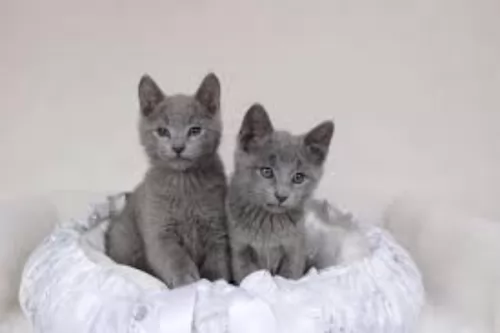 Because the Russian Blue is a naturally occurring breed, they are fairly healthy cats. Watch out for obesity and urinary tract infections with your cat.
Because the Russian Blue is a naturally occurring breed, they are fairly healthy cats. Watch out for obesity and urinary tract infections with your cat.
Obesity shortens a cat’s life. It puts extra pressure on the cat’s joints and it makes them more likely to develop disease. Then again, it is dangerous to suddenly put your obese cat on a strict diet so that he loses weight too quickly.
Your cat requires a gradual decrease in body weight. If you’re worried about your cat’s weight, rather speak to a veterinary surgeon who can explain to you and also draw up a weight loss program for your cat.
Remember too, that cats are carnivores and they simply have to have meat in their diet. Commercially manufactured cat foods of the highest quality are high in protein and low in carbohydrates.
Feline lower urinary tract disease is no joke for a cat. This disease affects your pet’s lower urinary tract – the bladder. Causes include bladder stones or bladder infections and inflammation in the urinary bladder.
You may notice your cat battling to urinate. Your cat will also no doubt cry out while trying to urinate and this is because the process is so painful. There may also be blood in the urine.
You may notice that your cat isn’t using his litter box but urinating elsewhere. Your cat will need to get to the vet as soon as possible. It may not be a life-threatening disease but it can be highly uncomfortable for your cat.
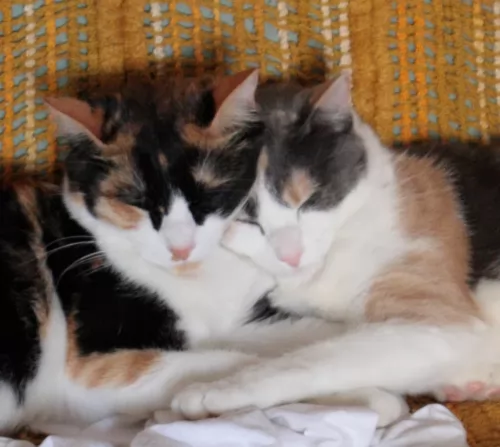 Prepare for your cat – have food dish, water bowl, litter box, cat food, brush, climbing tree, scratching post, cat toys, and cat bed to welcome your pet.
Prepare for your cat – have food dish, water bowl, litter box, cat food, brush, climbing tree, scratching post, cat toys, and cat bed to welcome your pet.
When it comes to commercially manufactured cat food, there are many excellent ones on the market and you can choose from dry and wet cat food. If in any doubt about what is best for your cat, speak to your vet. Your cat is a carnivore and will need food that pays special attention to meat. A kitten will require 4 small bowls of food a day and by one year of age your cat can be receiving 2 smaller meals a day. Provide cool, fresh water around the clock..
Brush your Dilute Calico gently once a week. Some of the longer-haired Dilute Calicos will require brushing twice a week. At this grooming time, check that the eyes are nice and clear, free of discharge, check that the inside of the ears are free of wax and dirt build-up and check inside the mouth that there aren’t any troublesome teeth.
Whether your cat is an indoor cat or he goes outside occasionally, check for ticks and fleas and get him to the vet to check for internal parasites. Your cat will need to be dewormed and to receive all his cat vaccines to avoid some of the deadly cat diseases there are.
If your cat does go outside, make sure he has a cat collar and an ID tag.
Keep the litter box hygienically clean as cats won’t use a messy litter box. You can buy small scoops and rakes from the pet shop and rake up his droppings throughout the day.
Always have your cat neutered or spayed as there are way too many unwanted kittens in the world. Having them ‘fixed’ reduces lots of illnesses such as urinary inflammation.
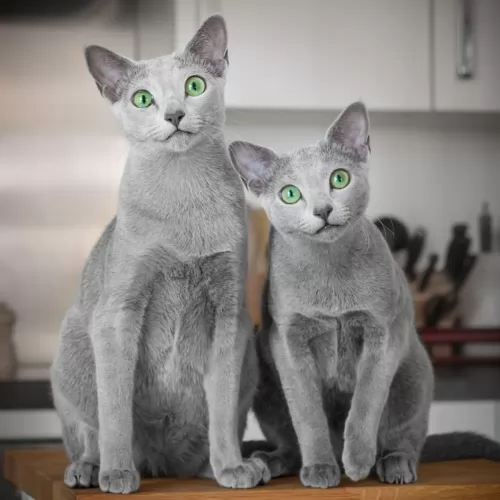 The Russian Blue’s beautiful blue coat is short and thick and will do well with a brush once a week. The cat just thrives on the attention during brush time too.
The Russian Blue’s beautiful blue coat is short and thick and will do well with a brush once a week. The cat just thrives on the attention during brush time too.
Trim your Russian blue’s nails regularly.
Provide your cat with everything he needs to make his life pleasant. Food and water bowls, a litter box, a collar and tag, a nice soft bed, grooming accessories, climbing tree, and a scratching post.
Make sure he has his cat vaccines and is treated for parasites.